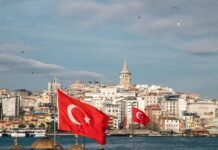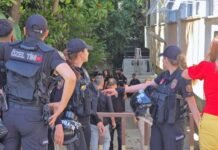Turkey has blocked online encyclopedia Wikipedia, the telecommunications watchdog, the Turkish Telecommunications Authority (BTK), said on Saturday, citing a law allowing it to ban access to websites deemed obscene or a threat to national security.
The move is likely to further worry rights groups and Turkey’s Western allies, who say Ankara has sharply curtailed freedom of speech and other basic rights and freedoms in the crackdown that followed failed coup attempt on July 15, 2016.
“After technical analysis and legal consideration based on the Law Nr. 5651, an administrative measure has been taken for this website (wikipedia.org) according to Decision Nr. 490.05.01.2017.-182198 dated 29/04/2017 implemented by Information and Communication Technologies Authority,” the BTK said in a written statement on its website.
It cited a law that allows it to block access to individual web pages or entire websites for the protection of public order, national security or the well being of the public. The watchdog is required to submit such measures to a court within 24 hours. The court then has two days to decide whether the ban should be upheld.
A block on all language editions of the Wikipedia website was detected at 8:00 a.m. (1.00 a.m. ET) on Saturday, monitoring group Turkey Blocks said on its website. “The loss of availability is consistent with internet filters used to censor content in the country,” it said. Turkey Blocks has also said that an administrative blocking order is usually expected to precede a full court blocking order in coming days.
When attempting to access the webpage using Turkish internet providers, users received a notice the site could not be reached and a “connection timed out” error.

Monitoring groups have accused Turkey of blocking access to social media sites such as Twitter or Facebook, particularly in the aftermath of militant attacks.
The government has in the past denied blocking access to some sites, blaming outages on spikes in usage after major events. But technical experts at watchdog groups say the blackouts on social media are intentional, aimed in part at stopping the spread of militant images and propaganda.
Turkey survived a military coup attempt on July 15, 2016 that killed over 240 people. Immediately after the putsch, the Justice and Development Party (AKP) government along with Turkey’s autocratic President Recep Tayyip Erdoğan called the coup “a great gift of God” and pinned the blame on the Gülen movement, inspired by US-based Turkish Islamic scholar Fethullah Gülen. Gülen strongly denied any involvement in the coup and asked for an international inquiry for which Turkish government did not respond.
Since last year’s failed coup, authorities have sacked or suspended more than 130,000 people from the civil service, police and judiciary and arrested about 50,000 mostly on alleged ties with faith based Gülen movement. Turkey is also the worst jailer of journalists and media workers in the world. Stockholm Center for Freedom (SCF) has announced the number of journalists behind bars as of April 20, 2017 reached to a new record with 235 languishing in Turkish jails, most without a trial and convictions.
Of these journalists, 214 are arrested pending trial and without a conviction. Most of the journalists do not even know what the charges are or what evidence, if any, the government has because the indictments were not filed yet. Also 104 journalists are wanted and 839 have been charged in Turkey.















